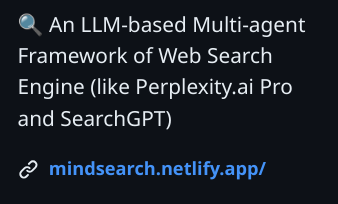


“AI search is going to become one of the key ways that people navigate the internet, and it’s crucial, in these early days, that the technology is built in a way that values, respects, and protects journalism and publishers. We look forward to partnering with OpenAI in the process, and creating a new way for readers to discover The Atlantic.”
Nicholas Thompson, CEO of The Atlantic

Perplexica is an open-source AI-powered searching tool or an AI-powered search engine that goes deep into the internet to find answers. Inspired by Perplexity AI, it’s an open-source option that not just searches the web but understands your questions. It uses advanced machine learning algorithms like similarity searching and embeddings to refine results and provides clear answers with sources cited.
Using SearxNG to stay current and fully open source, Perplexica ensures you always get the most up-to-date information without compromising your privacy.
Want to know more about its architecture and how it works? You can read it here.

Information seeking and integration is a complex cognitive task that consumes enormous time and effort. Search engines reshape the way of seeking information but often fail to align with complex human intentions. Inspired by the remarkable progress of Large Language Models (LLMs), recent works attempt to solve the information-seeking and integration task by combining LLMs and search engines. However, these methods still obtain unsatisfying performance due to three challenges:
(1) complex requests often cannot be accurately and completely retrieved by the search engine once;
(2) corresponding information to be integrated is spread over multiple web pages along with massive noise; and
(3) a large number of web pages with long contents may quickly exceed the maximum context length of LLMs.
Inspired by the cognitive process when humans solve these problems, we introduce MindSearch (思·索) to mimic the human minds in web information seeking and integration, which can be instantiated by a simple yet effective LLM-based multi-agent framework consisting of a WebPlanner and WebSearcher. The WebPlanner models the human mind of multi-step information seeking as a dynamic graph construction process: it decomposes the user query into atomic sub-questions as nodes in the graph and progressively extends the graph based on the search result from WebSearcher. Tasked with each sub-question, WebSearcher performs hierarchical information retrieval with search engines and collects valuable information for WebPlanner. The multi-agent design of MindSearch enables the whole framework to seek and integrate information parallelly from larger-scale (e.g., more than 300) web pages in 3 minute, which is worth 3 hours of human effort. Based on either GPT-4o or InternLM2.5–7B models, MindSearch demonstrates significant improvement in the response quality in terms of depth and breadth, on both closed-set and open-set QA problems. Besides, responses from MindSearch based on InternLM2.5–7B are preferable by humans to ChatGPT-Web (by GPT-4o) and Perplexity.ai applications, which implies that MindSearch with open-source models can already deliver a competitive solution to the proprietary AI search engine. Code and models are available at https://github.com/InternLM/MindSearch.

MindSearch: Mimicking Human Minds Elicits Deep AI Searcher
MindSearch is an open-source AI Search Engine Framework with Perplexity.ai Pro performance. You can simply deploy it with your own perplexity.ai style search engine with either close-source LLMs (GPT, Claude) or open-source LLMs (InternLM2.5–7b-chat). It owns following features:
🤔 Ask everything you want to know: MindSearch is designed to solve any question in your life and use web knowledge.
📚 In-depth Knowledge Discovery: MindSearch browses hundreds of web pages to answer your question, providing deeper and wider knowledge base answer.
🔍 Detailed Solution Path: MindSearch exposes all details, allowing users to check everything they want. This greatly improves the credibility of its final response as well as usability.
💻 Optimized UI Experience: Providing all kinds of interfaces for users, including React, Gradio, Streamlit and Terminal. Choose any type based on your need.
🧠 Dynamic Graph Construction Process: MindSearch decomposes the user query into atomic sub-questions as nodes in the graph and progressively extends the graph based on the search result from WebSearcher.




